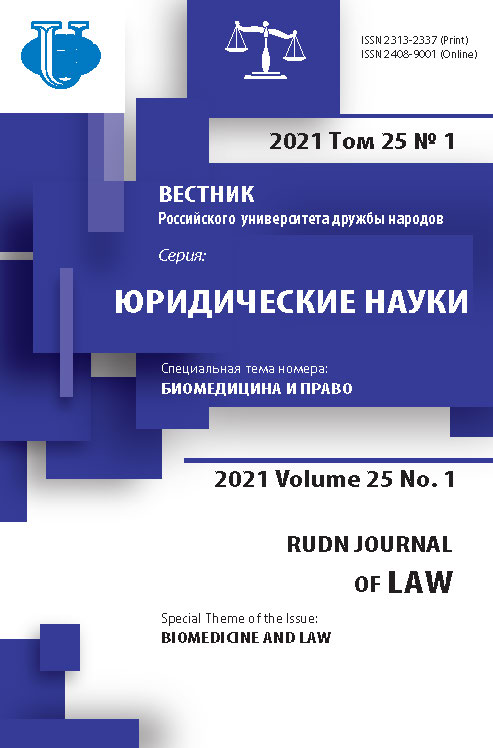System-synergetic approach to studying the essence of state power
- Authors: Zyrianov A.V.1
-
Affiliations:
- South Ural State University
- Issue: Vol 25, No 1 (2021): BIOMEDICINE AND LAW
- Pages: 248-262
- Section: LEGAL RESEARCH METHODOLOGY
- URL: https://journals.rudn.ru/law/article/view/26046
- DOI: https://doi.org/10.22363/2313-2337-2021-25-1-248-262
- ID: 26046
Cite item
Full Text
Abstract
This article is devoted to the problem of cognition and understanding of the essence of state power. Actualization is carried out by searching for a new paradigm approach in order to determine the fundamental principles that are correlated with the idea to optimize and increase the efficiency of the corresponding sphere of public relations. Acting as an alternative to the substantial and relativistic approach to the study of state power, the system-synergetic approach analyzes the phenomenon of “power” based on the definition of “system”, within which the functions of communication and regulation of public relations are assigned to power. As a result, power is seen as a property or function of a social, in particular, political system, the need for which is determined by the presence of society itself and the task of maintaining its integrity. The analysis allows stating that in most modern concepts there is a consistent rejection of the traditional interpretation of power as the result of subject-object relations, where the subject of power is an active, energetic principle, and the object undergoes impact. In contrast to the position of traditionalism, there is a tendency to interpret power as a complex polysystem permeating the entire social structure of society. As a structural and synergistic effect of the system, power is not a property of its individual element, since each element must certainly be correlated with other units of the given system. Power is an intrasystem relatedness of all elements. As a structural principle, power is realized on the basis of equivalent exchange, which means not the equivalence of the exchanged elements, but a situation in which one element is unconceivable without the other, i.e. one element exists in relation to the other, and co-develops with it. Thus, power really fulfills the function of streamlining socio-political ties, making their separation and differentiation expedient. Power, therefore, is the beginning, creating structures, increasing heterogeneities in a continuous social environment and connecting them together. Such a view allows interpreting power as a principle of functioning of the state system: if the state system, with the help of some value proposition, manages to reproduce the corresponding content of consciousness, then it functions quite stably.
About the authors
Aleksey V. Zyrianov
South Ural State University
Author for correspondence.
Email: zav-nauka@mail.ru
Candidate of Legal Sciences, Associate Professor of the Theory of State and Law, Constitutional and Administrative Law, Law Institute
76 Lenina ave., Chelyabinsk, 454080, Russian FederationReferences
- Ball, T. (1993) Power. Polis. Political Studies. (5), 36-42. (in Russian)
- Crozier, M. & Friedberg, E. (2000) L'acteur et le système. Paris, Edition du Seuil. (in French)
- Demidov, A. I. (1995) Power in unity and variety of its dimensions. State and law. (11), 3-11. (in Russian)
- Demidov, A.I. (2001) Teaching about politics: philosophical foundations. Moscow, Norma Publ. (in Russian)
- Deutsch, К. (1969) The nerves of government: Models of political communication and control. New York, The Free Press
- Easton, D. (1965) A Systems Analysis of Political Life. New York, John Wiley and Sons
- Hobbs, T. (1991) Works. In 2 Vols. Vol. 2. Sokolov, V.V. (ed.); Per. from lat. and English. Moscow, Thought Publ. (in Russian)
- Ilyin, V.V. (1993) Philosophy of Power. Moscow, Moscow State University Publ. (in Russian)
- Kubbel, L.E. (1988) Essays on Political Ethnography. Moscow, Science Publ. (in Russian)
- Luman, N.L. (2004) Society as a social system. Translated from German by Antonovsky, A. Moscow, Logos Publ. (in Russian)
- Noskov, E.G. (2011) Power Ontology: Total and Symbolic Nature of Power Relations. Diss … cand. in Philosophy. Samara, Samara State University. (in Russian)
- Parsons, Т. (1969) Politics and Social Structure. New York, Macmillan-The Free Press
- Podoroga, V.A. (1989) Power and Knowledge (archaeological search by M. Foucault). Power: sketches of the modern political philosophy of the West. Moscow, Science Publ. (in Russian)
- Rousseau, J.-J. (2018) On the social contract or the principles of political law. Moscow, Yurayt Publ. (in Russian)
- Rozhkov, V.P. (1998) West and Russia. Philosophical bases of the civilization constant of social consciousness. Diss … cand. in Philosophy. Saratov, Saratov University Publishing House. (in Russian)
- Shchedrovitsky, G.P. (2000) Organizational management thinking: ideology, methodology, technology. Course of lectures. From archive of Shchedrovitsky, G.P. V. 4. Moscow, Way Publ
- Simmel, G. (1996) Selected. Philosophy of Culture. V. 1. Translated from German. Moscow: Lawyer Publ. (in Russian)
- Tishkov, V.A. (1995) What is Russia? (Prospects of nationbuilding). Problems of Philosophy. (2), 6-15. (in Russian)
- Vesen, F. & Fedier, F. (2002) Philosophy French and German philosophy (F. Vesen). Imaginary. Power (F. Fedier). Per. from French by Bibikhin, V.V. Moscow: Science Publ. (in Russian)
- Weber, M. (1968) On charisma and institutional building. Chicago, London: Univ. of Chicago Press
Supplementary files















